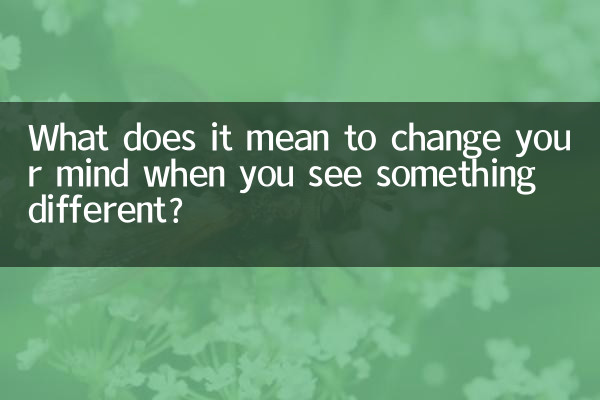Title: What does "different" mean when you see something different? ——Looking at human nature and choice from hot searches across the Internet
近10天,全网热议话题折射出社会百态,而“见异思迁”这一成语成为焦点之一。 People are curious: What does "different" refer to? Is it novelty, temptation, or dissatisfaction with the status quo? This article will analyze hot spots through structured data and explore in depth the meaning of "different".
1. Top 10 hotly searched topics on the Internet (June 10-June 20)

| Ranking | Topic keywords | Search volume (10,000) | Related phenomena |
|---|---|---|---|
| 1 | Controversy over college entrance examination application form | 2850 | Professional choice "hot and cold" alternating |
| 2 | A celebrity's personality collapsed | 1760 | Fans collectively "drop fans and return to dislike" |
| 3 | AI face-changing fraud case | 1520 | Misuse of technology leads to crisis of trust |
| 4 | Internet celebrity city tourism ebbs | 1380 | Rationality returns after the “check-in craze” |
| 5 | Job-hopping season data | 1250 | The average length of service for post-00s generation is 1.8 years |
2. Analysis of the word "different" in "seeing differences and thinking differently"
It can be seen from the hot search phenomenon that "different" has multiple meanings in different scenarios:
| scene | "Odd" orientation | psychological motivation |
|---|---|---|
| Job hopping | Higher salary/more relaxed environment | Compensation psychology for dissatisfaction with the status quo |
| Fans take off their fans | New character/new idol | transference needs for emotional projection |
| Tourism ebbs | Differentiated experience | The pursuit of freshness after aesthetic fatigue |
3. Dual interpretation of linguistics and psychology
1.Traceability of word meanings:
"Different" means "different" in ancient Chinese, and "Shuowen Jiezi" notes it as "fenye". The original meaning of the idiom refers to wanting to change one's mind when seeing different things. The phrase comes from "Zuo Zhuan·Xiang Gong's 29th Year".
2.modern interpretation:
Psychological research shows that when people face "oddness", the amygdala of the brain triggers an alert response, while the prefrontal cortex evaluates its value. This neural mechanism explains why some people are easily attracted to "oddness" while others are more conservative.
4. The selection dilemma behind hot searches
By comparing recent hot events, we can find three levels of the phenomenon of "seeing things differently":
| Hierarchy | Typical cases | “异”的作用 |
|---|---|---|
| individual level | Young people change jobs frequently | trial and error exploration |
| group level | Internet celebrity products decay quickly | The backlash of herd mentality |
| social level | AI technology ethics controversy | The conflict between innovation and tradition |
5. How to rationally treat the temptation of “difference”
1.Establish a value coordinate system: In major decisions such as college entrance examination choice, it is necessary to distinguish between "real needs" and "pseudo differences."
2.Be wary of “information cocoon rooms”: The "different" pushed by the algorithm may be just another kind of homogeneous content.
3.Grasp the change threshold: Psychology suggests that when satisfaction with the status quo is less than 60%, it is most beneficial to consider changes.
Conclusion: "Difference" is both a catalyst for progress and the source of impetuosity. Only by understanding its essence can we make clear choices in the era of big data.

check the details

check the details